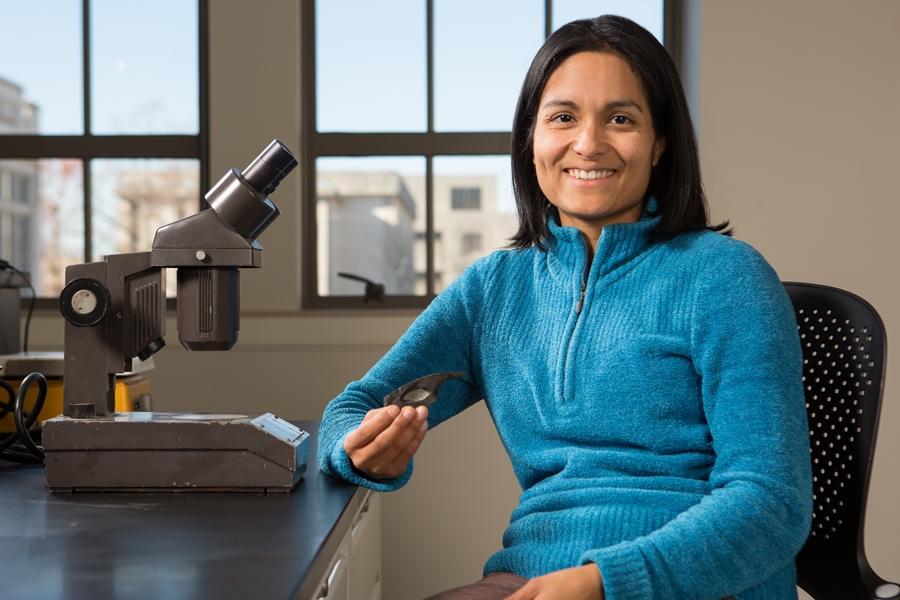Geosciences Researcher Awarded Inaugural Deep Carbon Observatory Diversity Grant

Celina Suarez, assistant professor in the Department of Geosciences, inaugural recipient of a Deep Carbon Observatory Diversity Grant.
Only seven researchers in the nation are among the inaugural class of Deep Carbon Observatory Diversity Grant recipients — including Celina Suarez, assistant professor of geosciences from the J. William Fulbright College of Arts and Sciences.
Suarez recently received the award from the American Geosciences Institute, which established these grants to support geoscience researchers with funds for national and international conferences to present Deep Carbon Observatory-affiliated research and attend DCO-related workshops, conferences and events. The funds also support lab or fieldwork that advances DCO-aligned research, or instrumentation time at DCO-affiliated facilities.
"Dr. Suarez's work is on the forefront of ecology and climate research," said Ralph Davis, professor and chair of the Department of Geosciences, and associate vice provost for Research and Economic Development at the University of Arkansas. "Though she's won many previous awards including an NSF fellowship, this latest accomplishment serves to further validate the importance of her research on a global scale and to support her continued successful track record of discovery."
Suarez's research has already taken her to locations such as the Cretaceous Cedar Mountain Formation of Utah, the Xinminpu Group of Gansu Province in China, the Prince Creek Formation off the North Slope of Alaska, and the Triassic-Jurassic Moenave Formation of southern Utah.
She primarily focuses on using trace element and stable isotope geochemistry of fossil vertebrates and invertebrates to understand paleoecology, paleoclimatology, and taphonomy of ancient terrestrial ecosystems. Suarez is particularly interested in past greenhouse climates and major climate shifts such as the mid-Cretaceous thermal maximum and the end Triassic extinction. She also uses carbon isotope chemostratigraphy to identify major global C-cycle shifts in Earth's deep-time history.
"My research aims to characterize the occurrence of large scale fluxes of carbon into the atmosphere by identifying the hallmark of rift eruptions, a large negative carbon isotope excursion in the rock and fossil record and associating it with the occurrence of extinction on land," said Suarez, a native of San Antonio, Texas who joined the University of Arkansas in 2012. "This study to some extent is an experiment that tests what can happen given large-scale carbon flux into the atmosphere."
Suarez has published multiple peer-reviewed articles and presented at numerous conferences. Additionally, in 2004, Suarez and her identical twin sister, Marina, had a new dinosaur from the Cedar Mountain Formation of Utah named after them for discovering the site it came from; it is called Geminiraptor suarezarum.
About the Deep Carbon Observatory (DCO): The Deep Carbon Observatory is a global research program to transform our understanding of carbon in Earth. The Deep Carbon Observatory is a community of scientists, from biologists to physicists, geoscientists to chemists, and others whose work crosses these disciplinary lines, forging a new, integrative field of deep carbon science.
About the DCO Diversity Grants: The Deep Carbon Observatory Diversity Grants program is made possible through support from the Alfred P. Sloan Foundation, and is designed to bolster participation of traditionally underrepresented geoscientists in the United States within the Deep Carbon Observatory community. Inaugural award recipients include Elizabeth Padilla (University of Tennessee Knoxville), Celina Suarez (University of Arkansas), Marina Suarez (University of Texas San Antonio), Jeremy Williams (Kent State University), Yadira Ibarra (Stanford University), John Paul Balmonte (University of North Carolina Chapel Hill) and Matthew Medina (University of Michigan).
About the American Geosciences Institute: The American Geosciences Institute is a nonprofit federation of geoscientific and professional associations that represents more than 250,000 geologists, geophysicists and other earth scientists. Founded in 1948, AGI provides information services to geoscientists, serves as a voice of shared interests in the profession, plays a major role in strengthening geoscience education, and strives to increase public awareness of the vital role the geosciences play in society's use of resources, resiliency to natural hazards, and interaction with the environment.
Contacts
Celina Suarez, assistant professor, Department of Geosciences
J. William Fulbright College of Arts and Sciences
479-575-4866,
casuarez@uark.edu
Andra Parrish Liwag, director of communications
J. William Fulbright College of Arts and Sciences
479-575-4393,
liwag@uark.edu
Headlines
PetSmart CEO J.K. Symancyk to Speak at Walton College Commencement
J.K. Symancyk is an alumnus of the Sam M. Walton College of Business and serves on the Dean’s Executive Advisory Board.
Faulkner Center, Arkansas PBS Partner to Screen Documentary 'Gospel'
The Faulkner Performing Arts Center will host a screening of Gospel, a documentary exploring the origin of Black spirituality through sermon and song, in partnership with Arkansas PBS at 7:30 p.m. Thursday, May 2.
UAPD Officers Mills and Edwards Honored With New Roles
Veterans of the U of A Police Department, Matt Mills has been promoted to assistant chief, and Crandall Edwards has been promoted to administrative captain.
Community Design Center's Greenway Urbanism Project Wins LIV Hospitality Design Award
"Greenway Urbanism" is one of six urban strategies proposed under the Framework Plan for Cherokee Village, a project that received funding through an Our Town grant from the National Endowment for the Arts.
Spring Bike Drive Refurbishes Old Bikes for New Students
All donated bikes will be given to Pedal It Forward, a local nonprofit that will refurbish your bike and return it to the U of A campus to be gifted to a student in need. Hundreds of students have already benefited.




